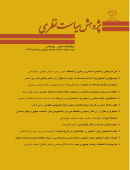موضعگیری ایدئولوژی آنارشیسم نسبت به دولت و تحقق آن در عصر جهانی شدن: بر اساس بازخوانی نظریۀ «وودکاک» و «نیومن»
محورهای موضوعی : پژوهش سیاست نظری
محمدعلي توانا
1
![]() ,
محمود علیپور
2
,
رقیه عزیزپور مرزونی
3
,
محمود علیپور
2
,
رقیه عزیزپور مرزونی
3
1 - دانشگاه شیراز گروه علوم سیاسی دانشکده حقوق و علوم سیاسی
2 - دکتری اندیشه سیاسی دانشگاه تربیت مدرس
3 - دانشگاه یزد
کلید واژه: دولت آنارشیسم جهانی شدن مرکزیت زدایی فراقلمروزدایی از حوزه دولت,
چکیده مقاله :
«دولت» یکی از عناصر اصلی و به عنوان عالی ترین قوۀ اجرایی درون مرزهای سرزمینی مطرح شده است. دولت - حداقل در عصر مدرن - مظهر قدرت و حاکمیت در جوامع بوده است. اساساً «آنارشیسم» به عنوان یک ایدئولوژی، نسبت به نهاد «دولت» و «قدرت دولتی» بدبین بوده، هرگونه مؤسسه مبتنی بر زور و اجبار را عامل تباهی زندگی اخلاقی و اجتماعی انسان قلمداد می کند. از سوی دیگر در عصر «جهانی شدن» به عنوان وضعیت سیاسی اجتماعی متأخر، عناصر حاکمیت با چالش اساسی روبه رو شده است. یکی از مشخصه های اندیشهای عصر جهانی شدن، تکیه کردن بر زمینۀ فکری جنبش «پست-مدرنیسم» است که ارزشهای دوران مدرن را به چالش می خواند. از ویژگی های اصلی این جنبش، نفی مطلق گرایی است که در این راستا، «ساختارِ شکل گرفتۀ قدرت» را مورد سرزنش قرار میدهد و به نقد سلطۀ آن در اجتماع سیاسی می-پردازد. بر این اساس سؤالی که پیش روی این پژوهش است این است که با توجه به تکثرگرایی و نقد عام گرایی در وضعیت «جهانی شدن»، مسیری برای ادامۀ حیات ایدئولوژی «آنارشیسم» وجود خواهد داشت؟ و آیا فرصت ابراز وجودِ «دولت ستیزی» و «اختیارگرایی» ایدئولوژی «آنارشیسم» در وضعیت «جهانی شدن» فراهم میآید؟ فرضیۀ این مقاله این است که در عصر جهانی شدن با رویکرد «مرکزیتزدایی» که در حال گسترش در حوزه های مختلف است، می توان گفت «قدرت دولتی» پراکنده و وظایف آن محدود شده و از سوی دیگر رؤیای جامعۀ بدون دولت و اجتماع اخلاقی مبتنی بر «اختیارگراییِ آنارشیسم»، در برخی حوزه ها تحقق مییابد. بنابراین سعی می شود با بازخوانی ایدئولوژی آنارشیسم - در نزد دو تن از شاخصترین متفکران معاصر این مکتب یعنی «جورج وودکاک» و «سال نیومن» - سرنوشت دولت در وضعیت جهانی شدن، تبیین و تحلیل گردد.
The State has been discussed as highest as the executive branch within the territorial boundaries. The State-at least in modern age- is manifestation of the relationship of power and domination that existed in all communities. Anarchism as an ideology, is pessimist toward the institution of “government” and “governmental power”, and considers every kind of institution as a destructive factor of moral and social life of humans. On the other hands, in the age of globalization, as the recent political social situation, the elements of dominance are faced with major challenges. One characteristic of the idea of globalization is reliance on the intellectual context of postmodernism movement that challenges the values of the modern era. The main feature of this movement is the rejection of absolutism, that In this regard, does blames structure that is formed by the Power and State, and involves in the critique of domination in the political community. Based on this fact, this question is raised that considering the pluralism and the critique of the popularism, in “globalization” situation, is there a route for the assertiveness the “Anarchism” ideology. Our hypothesis would be that in the age of globalization, Due to the Expanding Decentralization approach in different domains, It can be said that State powers is scattered and their tasks is limited and on the other It can be said the Dream of a society without State, and moral society based on “Anarchism …” can be realize in some areas. Therefore it can be attempted to explain and analyze the fate of government in the globalization situation by rereading the ideology of Anarchism-in the viewpoints of two of most prominent of contem rorery intellectuals of this school; “George Woodcock” and “Saul Newman”.
